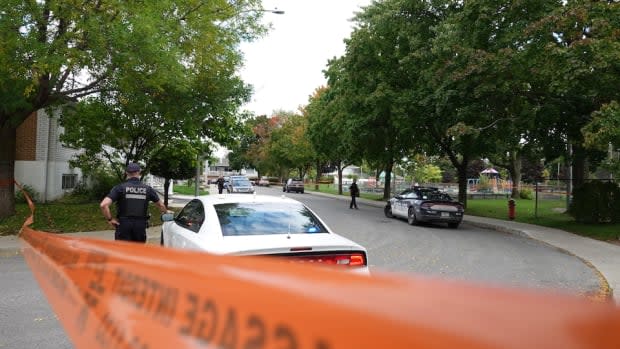Community groups essential to fighting Montreal gun violence, police chiefs say

Community groups are essential to fighting gun violence and the government needs to provide them with consistent and sustainable funding, according to police chiefs in the Montreal area.
"Community groups have been around for 20, 30, 40 years and they have 'their finger on the pulse of the field' more than we do," said Fady Dagher in an interview with Radio-Canada Wednesday. Dagher was accompanied by Sophie Roy, interim Montreal police (SPVM) director and Pierre Brochet, who heads the Laval police service (SPL).
Their comments come at a time when shootings in the Montreal area have occurred regularly and have caused concern among residents. In response, Quebec is spending $250 million additional funding over five years, mainly to hire 450 Montreal police officers.
Police have a lot to do and "short-term repression is necessary", Dagher said, but police work alone can't overcome crime.
"God knows that community groups, street workers, those people are in the midst of it," he said.
Brochet said the issue lies with community groups having to seek funding every year.
He also said the pandemic, which led to public health restrictions and people staying at home more, has weakened the social safety net, particularly for young people.
Tackling youth crime presents a different type of challenge, Dagher said.
"We're dealing with disorganized crime," he said. "Getting the message across to some 16-17-year-old in their basement, that's another story," he said.

'A sense of impunity'
A typical series of events usually precedes gun violence, according to Roy.
"Something may have happened in a schoolyard, something else could have happened on social networks, so police services have to work on all these levels, and we need our partners in schools and the community," said the interim Montreal police chief.
Roy said some young people have a "sense of impunity."
"There is a trivialization, an unawareness [on the part of certain young people] about what could happen to them. A lack of awareness of human life," she said. "Everyone will need to work together."

The police chiefs say they don't believe the gun violence situation is overwhelming their teams.
Brochet said there's been a 52 per cent decrease in the number of shots fired in the field, compared to the same period in 2021, which he calls a "great success."
Brochet also welcomes the Quebec's Operation Centaur, an $90-million provincewide initiative to crack down on gun-related crime.
"We work as a team in a really structured way," he said.
Police officers are also present in schools and at recreational sporting events, Brochet said.
"What we want is for a young person to not choose older, criminal and more violent role models and follow in their footsteps," he said.

 Yahoo Movies
Yahoo Movies 
